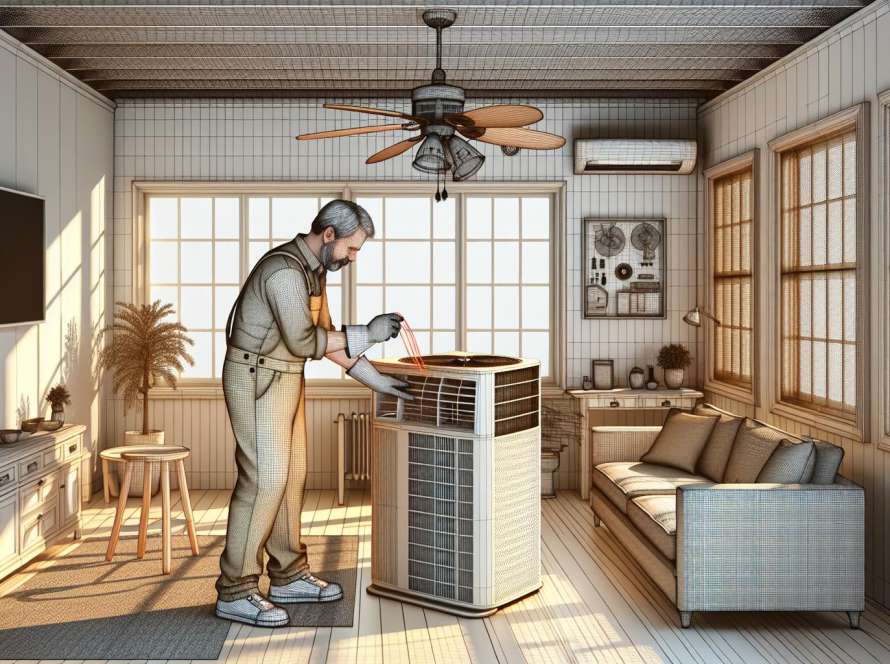So, we all know the struggle of battling Florida’s relentless humidity, especially when it comes to keeping our homes cool and comfortable. That’s where our trusty AC units come into play, working tirelessly to maintain the ideal indoor climate. But with great power comes great responsibility, and that means staying on top of AC maintenance to ensure optimal performance. In the Sunshine State, where AC is a lifeline rather than a luxury, understanding the ins and outs of proper maintenance is key to avoiding costly breakdowns and maximizing efficiency. Let’s dive into the essential tips and tricks for keeping your AC unit in top shape and your indoor environment refreshingly cool, even in the face of Florida’s notorious humidity.
Importance of AC Maintenance in Florida
In the sunny state of Florida, where the humidity levels can soar, proper AC maintenance is crucial for keeping homes cool and comfortable. Let’s delve into why maintaining your air conditioning unit is so essential in Florida:
For Beginners: Understanding the Basics
- Regular maintenance helps prevent unexpected breakdowns.
- Cleaning or replacing air filters improves air quality and efficiency.
- Checking ducts for leaks ensures optimal airflow.
For Intermediate Homeowners: Enhancing Your AC Performance
- Schedule professional tune-ups at least once a year.
- Cleaning coils and fins improves AC efficiency.
- Invest in a programmable thermostat for energy savings.
- Monitor refrigerant levels to prevent cooling issues.
- Inspect and seal ductwork for improved airflow.
- Consider upgrading to a high-efficiency AC unit for long-term savings.
Proper maintenance not only extends the lifespan of your AC unit but also saves energy and reduces operating costs, making it a worthwhile investment in the long run.
Understanding Florida’s Humidity Levels

Florida’s humidity levels can be challenging to deal with, especially when it comes to maintaining your AC system. Here’s a breakdown to help you navigate the impact of humidity on your air conditioning unit:
For Beginners: Grasping the Basics
- Humidity Factor: High humidity makes your AC work harder, leading to increased energy consumption.
- Condensation Concerns: Excess humidity can result in water pooling around your AC unit, causing damage.
- Mold and Mildew: Florida’s humidity creates an ideal environment for mold and mildew growth if not controlled.
For Intermediate Users: Managing Your System
- Dehumidification: Consider using a dehumidifier in conjunction with your AC unit to control indoor humidity levels.
- Ventilation Check: Ensure proper ventilation in your home to reduce moisture levels and ease the burden on your AC system.
- Regular Maintenance: Schedule routine AC check-ups to address any issues exacerbated by high humidity.
- Optimal Settings: Adjust your AC settings to balance cooling and dehumidification, especially in peak humidity seasons.
- Insulation Inspection: Check for proper insulation to prevent humidity from seeping into your home and overworking your AC unit.
- Smart Thermostat Integration: Invest in a smart thermostat that can adjust settings based on humidity levels for efficient operation.
Navigating Florida’s humidity levels requires a combination of basic understanding, proactive management, and advanced strategies to ensure your AC system performs optimally in this challenging environment.
Signs of AC Unit Struggling with Humidity
For Beginners: Recognizing Basic Signs
- Sticky Air: If you feel sticky or clammy indoors, it could indicate that your AC is not effectively removing moisture from the air.
- Musty Smells: A musty odor in your home can be a sign of excess moisture, potentially leading to mold growth.
For Intermediate Users: Digging Deeper
- Visible Condensation: Excessive condensation on windows or around vents can signal that your AC is not adequately dehumidifying the air.
- Increased Energy Bills: A sudden spike in energy bills without a change in usage patterns might mean your AC is working harder due to humidity.
- Ice Build-Up: Ice forming on the AC unit can indicate issues with humidity control and airflow.
- Repeated Mold Growth: If you notice mold recurring despite cleaning, it could be a result of persistent high humidity levels.
Stay proactive in monitoring your AC unit’s performance to ensure it can handle Florida’s humidity effectively.
Tips for Optimal AC Maintenance in High Humidity

For Beginners: Basic Maintenance Steps
- Clean or Replace Air Filters Regularly: Clogged filters hinder airflow and reduce efficiency.
- Check and Clear the Condensate Drain Line: Clogs can lead to water backup and humidity issues.
- Inspect Thermostat Settings: Ensure your thermostat is set to the right temperature for comfort.
- Schedule Professional Inspections: Annual maintenance by a technician can prevent major issues.
For Intermediate Users: Enhancing AC Performance
- Invest in a Dehumidifier: Supplement your AC’s moisture removal in humid conditions.
- Seal Air Leaks: Prevent warm, humid air from entering your home through gaps.
- Opt for Programmable Thermostats: Set schedules to optimize cooling and reduce humidity.
- Consider UV Lights: Help control mold and bacteria growth within the HVAC system.
- Perform Regular Coil Cleaning: Dirty coils reduce efficiency and cooling capacity.
- Monitor Refrigerant Levels: Low levels can impact dehumidification and cooling.
- Upgrade to Energy-Efficient Units: Modern AC systems offer better humidity control.
- Install Whole-House Ventilation: Improve air circulation and reduce humidity buildup.
| Key Fact | Data/Statistic |
|---|---|
| Humidity levels above 60% can lead to mold growth and discomfort. | Keep indoor humidity levels between 30-50% for optimal comfort. |
| Regular AC maintenance can improve energy efficiency by up to 15%. | Professional tune-ups help extend the lifespan of your AC system. |
Conclusion
Ensuring optimal AC maintenance in Florida’s high humidity is crucial for efficient cooling and indoor comfort. By following the recommended tips, we can protect our AC systems from mold growth, improve energy efficiency by up to 15%, and extend their lifespan. From basic tasks like cleaning air filters to advanced steps such as installing UV lights and whole-house ventilation, every action contributes to a well-maintained AC unit. Remember, regular professional inspections and maintenance are key to avoiding costly repairs and maximizing performance. With a proactive approach to AC care, we can enjoy cool, comfortable indoor environments while saving energy and money in the long run.

